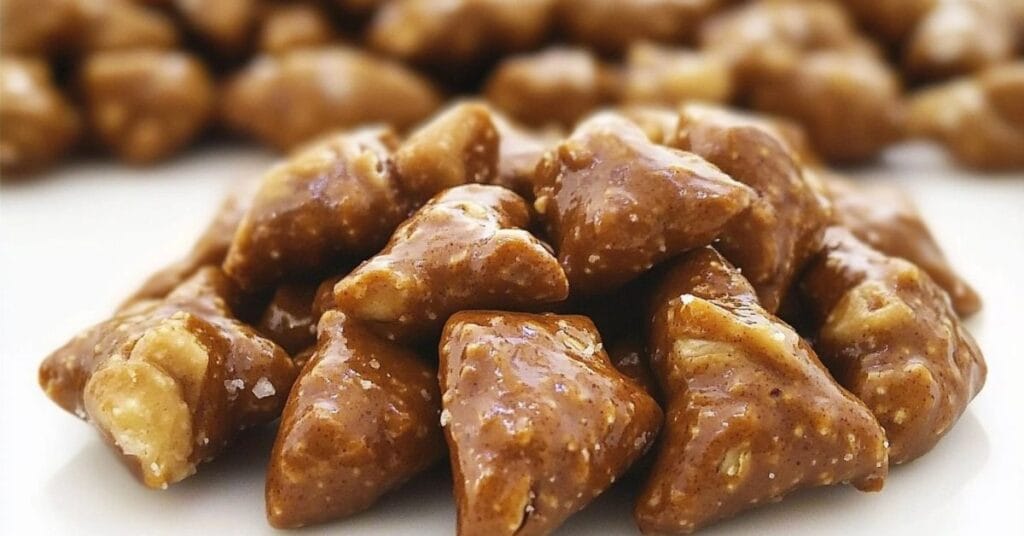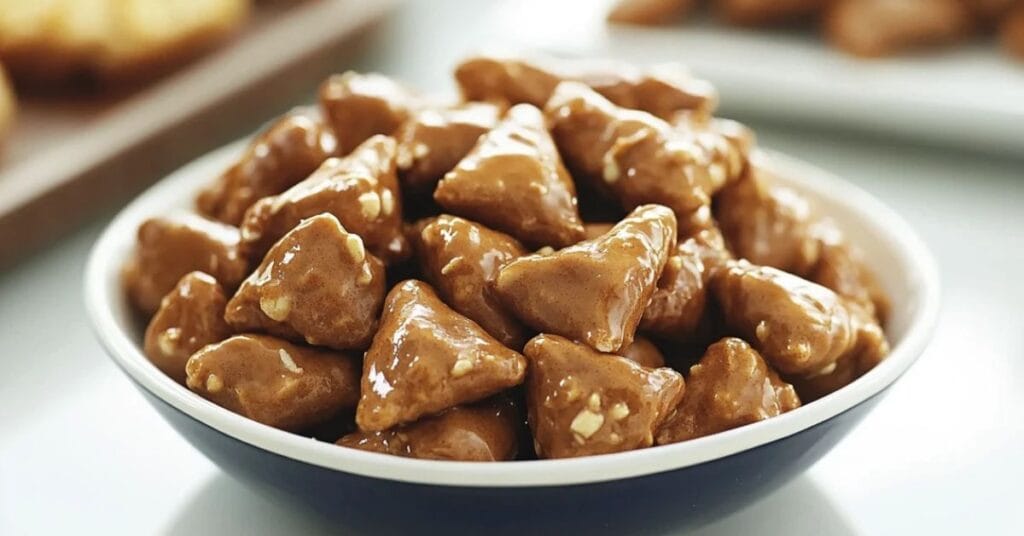Peanut butter pretzels have gained immense popularity among snack enthusiasts, but their health benefits remain a topic of debate. With a perfect combination of salty pretzels and creamy peanut butter filling, they appeal to both sweet and savory snack lovers. Yet, the question arises: Are peanut butter pretzels a healthy snack? To address this, we will analyze their nutritional profile, benefits, drawbacks, and compare them to other snack options.
What Are Peanut Butter Pretzels?
Composition of Peanut Butter Pretzels
Peanut butter pretzels are crafted by filling crunchy pretzel shells with creamy or powdered peanut butter. The combination delivers a harmonious blend of textures—crispiness from the outer layer and smoothness from the filling. Common ingredients include wheat flour, peanut butter, sugar, and salt, along with preservatives to extend shelf life. However, specific brands may vary their recipes, introducing added flavors or dietary adjustments, like gluten-free options.
Interestingly, their appeal lies not just in taste but also in convenience. Peanut butter pretzels are a portable snack, often sold in resealable bags, making them an excellent option for on-the-go munching. Their simple preparation and long shelf life further add to their practicality.
Why They Are Popular Among Snack Lovers
The popularity of peanut butter pretzels stems from their universal appeal. They cater to diverse palates by blending sweet and savory flavors, which make them versatile. Their ready-to-eat nature and ability to satiate hunger quickly add to their charm. Additionally, their branding as a “healthier” snack alternative compared to chips or cookies entices consumers who seek indulgence without guilt.
Consumers also appreciate their relatively balanced macronutrient profile, which includes fats from peanut butter and carbohydrates from pretzels. This mix appeals to those looking for an energy boost, particularly during long workdays or after workouts.
Are Peanut Butter Pretzels a Healthy Snack?
Macronutrient Breakdown of Peanut Butter Pretzels
To determine if peanut butter pretzels are a healthy snack, examining their macronutrient composition is crucial. A typical serving of peanut butter pretzels (around 30 grams) contains approximately:
- Calories: 130–150 kcal
- Protein: 4–6 grams
- Fat: 6–8 grams, with minimal saturated fat
- Carbohydrates: 15–18 grams, including 2–4 grams of sugar
This profile reveals that peanut butter pretzels offer a moderate protein source but are calorie-dense due to their combination of carbs and fats. They can be a good option for energy replenishment but might not suit those on calorie-restricted diets. For a deeper dive into their nutrient details, check out nutritional information for peanut butter pretzels.
Micronutrient Content and Its Role in Health
While their macronutrients are well-known, the micronutrient content of peanut butter pretzels is less discussed. These snacks provide small amounts of essential vitamins and minerals, such as:
- Magnesium: Found in peanuts, beneficial for muscle and nerve function.
- Iron: Present in wheat flour, supports oxygen transport in the body.
- Sodium: High levels contribute to flavor but may impact blood pressure.
However, their micronutrient density is not sufficient to classify them as a nutrient-rich food. Regular consumption without dietary balance might lead to deficiencies in essential vitamins and minerals.
Health Benefits of Peanut Butter Pretzels
Protein and Energy from Peanut Butter Filling
The peanut butter filling in these pretzels is a significant source of protein, offering around 4–6 grams per serving. Protein is vital for muscle repair, energy metabolism, and satiety. For individuals with busy lifestyles or those engaging in physical activities, this snack can provide a quick energy boost. Moreover, peanut butter contains healthy fats that support brain function and cardiovascular health.
Balanced Energy Snack for Active Lifestyles
Peanut butter pretzels cater to active individuals by delivering balanced energy through carbohydrates, fats, and proteins. They can act as a post-workout snack or a mid-day fuel source, keeping energy levels steady. For more insights, explore the health benefits of peanut butter pretzels.
By combining practicality with taste, peanut butter pretzels strike a balance between indulgence and sustenance, making them an appealing choice for diverse demographics. Nevertheless, understanding their drawbacks is equally essential.
Drawbacks of Peanut Butter Pretzels
High Calorie Density and Potential Overeating
One of the major concerns about peanut butter pretzels is their high calorie density. A small serving packs significant calories, which can quickly add up, especially when consumed mindlessly. For example, one ounce (approximately 30 grams) of peanut butter pretzels contains 130–150 calories. The compact size and addictive taste often lead to overeating, making portion control a challenge.
To mitigate this, individuals can pre-portion their snacks or pair them with lower-calorie, nutrient-dense foods. Recognizing the importance of moderation is crucial for preventing excessive calorie intake. Learn more about the potential drawbacks of peanut butter-filled pretzels.
Sodium and Sugar Content Concerns
Another drawback lies in their sodium and sugar levels. A standard serving often contains 200–300 milligrams of sodium, which accounts for a significant portion of the recommended daily limit. High sodium intake is linked to hypertension and other cardiovascular issues.
In addition to sodium, many brands add sugar to enhance the flavor of peanut butter pretzels. These added sugars can contribute to weight gain, insulin resistance, and other metabolic disorders when consumed in excess. Opting for low-sodium or unsweetened varieties can help minimize these concerns while retaining the snack’s appeal.
Comparing Peanut Butter Pretzels to Other Snacks
How They Compare Nutritionally to Chips and Nuts
When compared to traditional snacks like potato chips and nuts, peanut butter pretzels strike a middle ground. Here’s a quick comparison:
| Snack Type | Calories (per ounce) | Protein (grams) | Fat (grams) | Carbs (grams) | Sodium (mg) |
|---|---|---|---|---|---|
| Peanut Butter Pretzels | 130–150 | 4–6 | 6–8 | 15–18 | 200–300 |
| Potato Chips | 150–160 | 2–3 | 10–11 | 15–17 | 170–200 |
| Almonds | 160 | 6 | 14 | 6 | 0–5 |
While peanut butter pretzels offer higher protein content than chips, they fall short of nuts in terms of healthy fat content and overall nutritional benefits. This makes them a more balanced choice than chips but less nutrient-dense compared to raw nuts.
Cost and Convenience Factor
Another aspect to consider is the cost and convenience of peanut butter pretzels. They are often priced competitively compared to premium snacks like nuts but may cost more than regular chips. Additionally, their resealable packaging and long shelf life make them a convenient option for individuals seeking a portable snack.
However, some budget-conscious consumers might prefer making homemade versions to save money while enhancing nutritional value. This allows for greater control over ingredients, including the option to reduce sodium and sugar content.
Dietary Considerations for Peanut Butter Pretzels
Allergies and Intolerances
For individuals with food allergies, peanut butter pretzels may pose significant risks. The peanut filling is a common allergen, and the pretzel shell often contains gluten, making the snack unsuitable for those with celiac disease or gluten sensitivity. Manufacturers sometimes provide allergen warnings on packaging, so always check labels carefully.
Additionally, cross-contamination during production may affect individuals with severe allergies. Opting for allergen-free brands or alternatives can provide a safer snacking option for sensitive individuals.
Are Peanut Butter Pretzels Suitable for Specific Diets?
The suitability of peanut butter pretzels varies depending on dietary preferences. While they may fit into balanced diets in moderation, they are less compatible with specific regimens:
- Keto Diet: Their high carbohydrate content makes them unsuitable for ketogenic diets, which prioritize low-carb, high-fat foods.
- Low-Sodium Diet: Individuals managing hypertension or cardiovascular concerns should avoid regular consumption due to the high sodium levels.
- Vegan Diet: Some brands use animal-derived ingredients in their formulations. Checking labels is necessary to confirm vegan compatibility.
Being mindful of these factors helps ensure that dietary goals are not compromised while enjoying this snack.
Healthy Alternatives to Peanut Butter Pretzels
Making Healthier Homemade Versions

Crafting peanut butter pretzels at home allows for greater control over ingredients and nutrition. By using whole-grain pretzels, natural peanut butter, and minimal added salt or sugar, a healthier version can be prepared. Here’s a simple recipe:
- Choose whole-grain or gluten-free pretzel shells.
- Fill them with unsweetened or lightly sweetened peanut butter.
- Bake for a few minutes to enhance the crisp texture.
This DIY approach reduces sodium and sugar levels while retaining the snack’s signature flavor and texture.
Substituting with Better Snack Options
If peanut butter pretzels are not suitable, several healthier alternatives offer similar taste profiles. For example:
- Almond Butter and Celery Sticks: A nutritious, low-carb option with healthy fats and fiber.
- Hummus and Pretzel Chips: Provides protein and less sugar, with customizable flavors.
- Dark Chocolate and Nut Mix: Satisfies sweet cravings while offering antioxidants and heart-healthy fats.
Switching to these alternatives ensures a balance of taste and nutrition without compromising on health goals.
Incorporating Peanut Butter Pretzels Into a Healthy Diet
Portion Control Tips for a Balanced Snack
When it comes to enjoying peanut butter pretzels as part of a healthy diet, portion control plays a pivotal role. These snacks are not only delicious but also calorie-dense, which makes it easy to overindulge. To make peanut butter pretzels a healthier choice, it’s essential to stick to manageable servings. A common recommendation is limiting yourself to a 1-ounce portion, roughly equivalent to a small handful, which contains around 130–150 calories.
Here are some effective strategies to control portions:
- Use a measuring cup or kitchen scale to pre-portion peanut butter pretzels before eating.
- Pair them with nutrient-rich foods like fresh fruits or vegetables to make a more balanced snack.
- Practice mindful eating by slowing down and fully enjoying each bite instead of snacking while distracted.
By following these tips, peanut butter pretzels can be enjoyed guilt-free without compromising dietary goals.
Pairing Peanut Butter Pretzels with Other Foods
To improve the nutritional profile of peanut butter pretzels, consider pairing them with complementary foods. This strategy helps balance their macronutrient content, especially their high levels of carbohydrates and fats. Some excellent pairings include:
- Apple slices or bananas: Add natural sweetness and dietary fiber for a more filling snack.
- Greek yogurt: Boost protein intake while introducing a creamy texture that complements the crunch of peanut butter pretzels.
- Vegetable sticks like celery or carrots: Enhance the snack with fiber, vitamins, and a fresh crunch.
By incorporating these pairings, peanut butter pretzels transform from a simple snack into a well-rounded option that satisfies hunger while providing more nutrients.
Storage and Shelf Life of Peanut Butter Pretzels
Best Practices for Storing Peanut Butter Pretzels
Proper storage ensures that peanut butter pretzels remain fresh and delicious for an extended period. Exposure to air and moisture can make them stale, and high temperatures may affect the quality of the peanut butter filling. To store peanut butter pretzels effectively:
- Keep them in airtight containers to lock out moisture.
- Store in a cool, dry location away from heat or direct sunlight.
- Avoid storing opened packages for more than a few weeks to maintain their crisp texture.
If stored correctly, unopened peanut butter pretzels typically have a shelf life of several months, making them an ideal pantry staple for long-term snacking.
How Long Do Peanut Butter Pretzels Last?
The shelf life of peanut butter pretzels largely depends on their packaging and storage conditions. On average:
- Unopened packages: Last 6–12 months when stored in a cool, dry place.
- Opened packages: Retain their freshness for 2–3 weeks, especially if resealed or transferred to an airtight container.
Always check expiration dates and inspect for any unusual changes in texture, smell, or taste before consuming.
FAQs About Peanut Butter Pretzels
Are Peanut Butter Pretzels High in Calories?Can They Be Part of a Weight-Loss Diet?Are There Gluten-Free Options?How Much Protein Do Peanut Butter Pretzels Provide?What Is the Best Brand for Healthier Peanut Butter Pretzels?
Final Thoughts on Peanut Butter Pretzels
Peanut butter pretzels are a flavorful and convenient snack that combines the best of salty and sweet. They appeal to a wide range of snack lovers, offering a satisfying mix of textures and flavors. However, their nutritional profile raises questions: Are peanut butter pretzels a healthy snack? While they do provide protein and energy, their high calorie and sodium content make moderation essential.
For those wondering, are peanut butter pretzels a healthy snack?, the answer depends on how they fit into your overall diet. They can be enjoyed as part of a balanced eating plan, especially when paired with nutrient-dense foods or consumed in controlled portions. By practicing mindful eating and understanding their nutritional limitations, you can enjoy peanut butter pretzels without derailing your health goals.
Ultimately, are peanut butter pretzels a healthy snack? Yes, but only when consumed thoughtfully. They should not replace nutrient-rich alternatives but can complement a diet when paired with fiber-rich fruits, vegetables, or protein-packed options like Greek yogurt. Moderation and balance are key to making peanut butter pretzels a tasty and healthy addition to your snacking routine.






